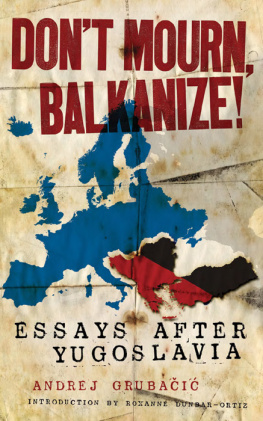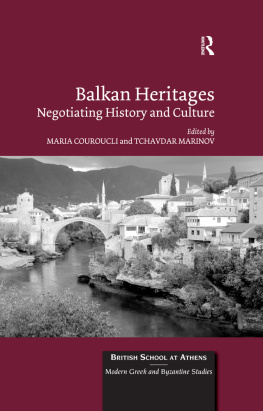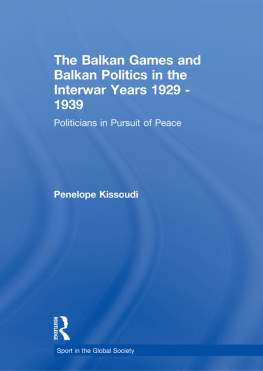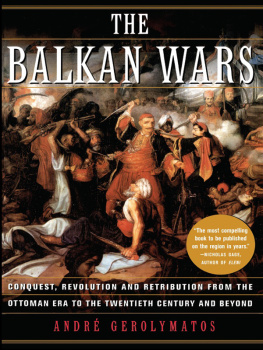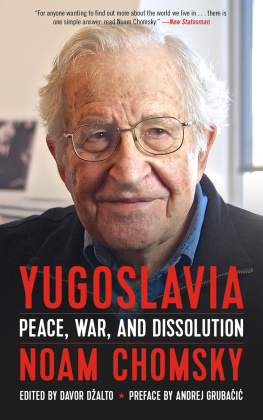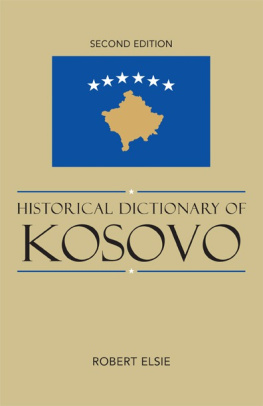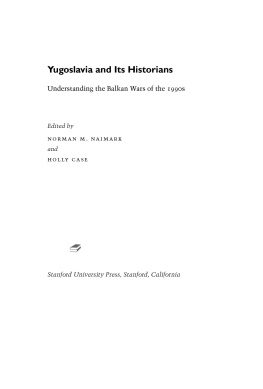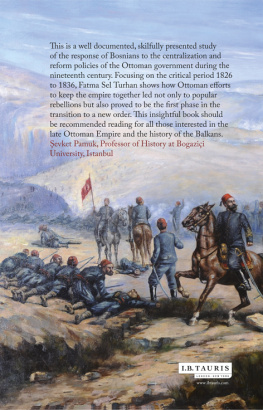These thoughtful essays offer us a vivid picture of the Balkans experience from the inside, with its richness and complexity, tragedy and hope, and lessons from which we can all draw inspiration and insight. Noam Chomsky, MIT
The history of Yugoslavia is of global relevance, and theres no one better placed to reveal, share, and analyze it than Andrej Grubai. From the struggle of the Roma to the liberating possibilities of federalism from below, this collection of essays is required and radical reading. Raj Patel, author of Stuffed and Starved: Markets, Power and the Hidden Battle for the Worlds Food System
This book of essays shows a deep grasp of Yugoslav history and social theory. It is a groundbreaking book, representing a bold departure from existing ideas, and an imaginative view to how a just society in the Balkans might be constructed. Howard Zinn, author of A Peoples History of the United States
Dont Mourn, Balkanize! is a powerful and courageous book refusing to let the memory of a long history of colonization of the Balkans by the states-architects of Europe be erased or lead to a politics of resignation. Its vision of a federalism from below sustained by networks of autonomous, culturally diverse communities has a significance that transcends the Balkans. Silvia Federici, author of Caliban and the Witch: Women the Body and Primitive Accumulation.
I cannot think of another work that even tries to accomplish what Andrej Grubai has artfully undertaken in this volume. Dont Mourn, Balkanize! is the first radical account of Yugoslav history after Yugoslavia. Surveying this complex history with imagination and insight, Grubai's book provides essential information and perspective for all those interested in the recent history of this part of the world. Michael Albert, author of Parecon: Life After Capitalism
Andrej Grubai is a rare genuine authority on the recent history and politics of the Balkans. I have known him for a decade, have followed and read his work with profit, and corresponded with him on matters which I found difficult in doing my own writing in this field. Edward S. Herman, Wharton School, University of Pennsylvania
I can think of no better person than my close friend Andrej Grubai to put the shattered pieces of a broken region back together again in a book that illuminates the abuses of rulers over the ruled. Grubai is a native of the former Yugoslavia, an academic, and an anarchist historian; his encyclopedic knowledge make him a crucial commentator for all interested in this often under-reported part of the world. Turning a tragic past upside down while agitating for a new emancipatory future, Dont Mourn Balkanize! is the perfect remedy for the elite narrative of domination. Chris Spannos, ZNet, author of Real Utopia: Participatory Society for the 21st Century
Andrej Grubai returns with another magnificent book that in the finest tradition of Yugoslav Zenitism reinvents a concept of the Balkan barbaro-genius and its prefigurative adventure into new and authentic political structures and praxis. Dont Mourn, Balkanize! shouldnt be read solely as a hidden history of the Balkans and inspiring political struggles of the (newest) social movements in the region, but also as a much needed epistemological and methodological manual how to write such a history. Peranalogiam with Boaventura de Sousa Santos, Eduardo Restrepo, and Arturo Escobar, Grubai develops other histories/history otherwise that builds on a new epistemological paradigm in attempt to visualize the hidden, and, above all, to give credit to all those ideas, practices, and subjects that have been for too long marginalized, trivialized, and excluded. Finally, we have a book that documents the Balkan anarchist movements and their share in a global struggle for another, better world, and their important contribution to win, ergo balkanize it! Ziga Vodovnik, author of Anarchy of Everyday Life and Notes on Anarchism and Its Forgotten Confluences
Its wonderful to read something on the Balkans that goes beyond doom and gloom. Andrej Grubai turns the world on its head, especially with his notion of Balkanisation from belowa return to what is the most precious part of our history a pluricultural vision of multiethnic, indeed transethnic, antiauthoritarian society, from which he can convincingly call for a Balkanisation of Europe and of the world. A delight. John Holloway, author of Change the World Without Taking Power: The Meaning of Revolution Today
Andrej Grubai shows that as their civilization collapses we barbarians must think anew. To turn the world upside down requires an uprooting of our political and geographic vocabulary, capitalist and socialist alike. Grubai, a foreigner in his native Yugoslavia, does this brilliantly. To balkanize once described political, economic, and religious fragmentation. After this book it must mean anti-capitalist possibility, local autonomy, the organic commonwealth, and accompaniment of the Other. Bravo! Peter Linebaugh, author of The Magna Carta Manifesto: Liberties and Commons for All.
Growing up in Austria in the 1980s, I had a number of Yugoslav friends; in the 1990s, I had to learn that they were not Yugoslav but Serbian, Croatian, Bosnian, etc. It was a confusing timenot least because my friends new identities meant that some of them could no longer talk to one another. In this essential collection of essays, Andrej Grubai describes the unraveling of Yugoslavia and its complex politics from an insiders perspective. By doing so, he yields neither to nationalist sentiments nor to the glorification of state socialism. This is no easy task, as Grubai treads on difficult terrain: the Balkans are arguably Europes very own exotic other, a region that has always been both demonized for its alleged backwardness and barbarianism and romanticized for everything from freedom-loving mountain bandits to fiery Gypsy fiddlers. In Dont Mourn, Balkanize! we meet none of these simplifications. Grubai portrays a region haunted by a familiar struggle: that between authoritarianism and greed on the one side, and rebellion and solidarity on the other. Where Grubai stands is never in doubt. May the Balkanization from Below span all of Europe! Gabriel Kuhn, author of Life Under the Jolly Roger: Reflections on Golden Age Piracy and Soccer Vs. the State: Tackling Football and Radical Politics
An absolutely top-notch scholar as well as a highly committed activist, Andrej Grubai has succeeded again in writing a must-read for those interested in transformative social change. Daniel Gross, organizer, IWW Starbucks Workers Union
Here are two books. The first book is a searing critique of U.S. imperialist aggression and official hypocrisy. Consider: At a time when the United States demanded of other, smaller countries that they approve bilateral agreements shielding U.S. citizens from extradition to an international criminal court, the United States compelled the extradition to just such a court of the president of Serbia, a sovereign nation. Further, the U.S. government, unable to obtain approval from the United Nations, misused a network of states created for another purpose (NATO) to approve the bombing of Serbia. For three months bombs were dropped from 40,000 feet on ancient bridges and innocent civilians without the loss of a single American pilot. Thereafter the United States created in its new southeastern Europe protectorate a huge new military base and, apparently, sites for the interrogation and torture of so-called enemy combatants, while insisting on structural adjustment and privatization that smoothed the way for investment by multinational corporations. These were the elements of the shock and awe template that the United States then sought to impose on Iraq and Afghanistan. After preliminary invasions of Grenada and Panama, the Balkans thus served to launch what has come to be called Americas Long War against terrorism. The second book-within-a-book looks at the small green shoots of new life that have begun to come up through the floor of this fire-blackened forest. The courageous, persistent opposition to privatization by workers at the pharmaceutical plant Jugoremedija has prompted the federation of workers of a number of enterprises into a broader resistance front. Meanwhile, survivors of these hard times have begun to dream dreams that go beyond illegal diplomatic recognition of Kosovo as an independent nation or partition of Kosovo into Albanian and Serbian components. The hope is that the Balkans, precisely because of the many ethnic groupsincluding the Roma, or Gypsiesthat have sought to find ways to live together there over the centuries, might pioneer for us all a model of regional community that avoids the concentration of all the means of compulsion in one centralized state and instead seeks horizontal bonds of mutual aid. Staughton Lynd, historian, attorney, labor activist, and pacifist, co-author of

